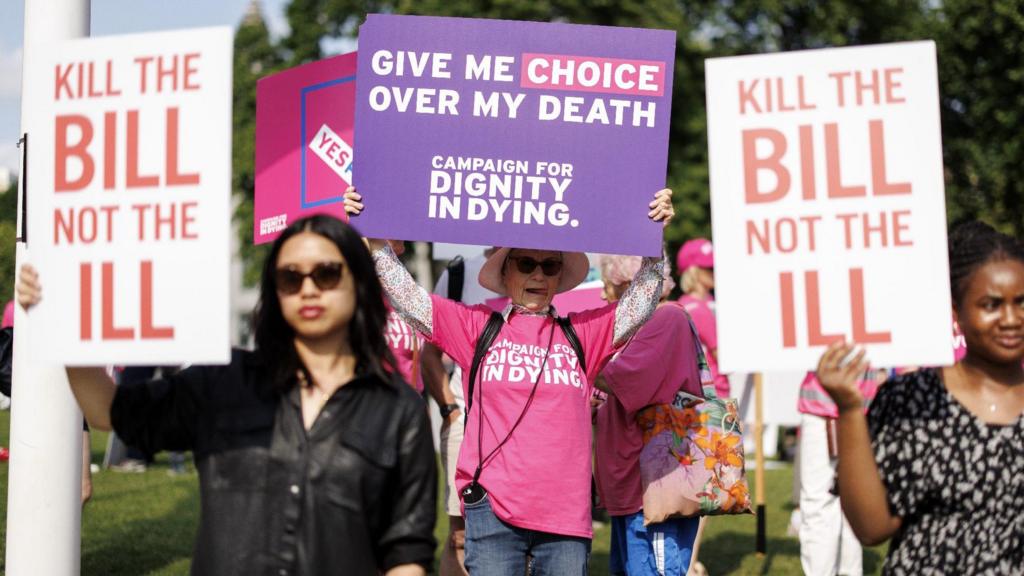“`html
Members of the House of Lords are advocating for increased time to deliberate on legislation that would legalize assisted dying in England and Wales, as the bill navigates a protracted path through the upper chamber.
Peers have proposed over 900 amendments, a number that experts suggest is unprecedented for a piece of legislation introduced by a backbench MP.
Proponents of the bill have voiced concerns that the sheer volume of amendments is a delaying tactic, alleging deliberate attempts to impede its progress.
Conversely, opponents argue that substantial modifications are necessary to safeguard vulnerable individuals and ensure the safe operation of any such scheme.
The Terminally Ill Adults (End of Life) Bill received approval from MPs in June and successfully passed its first stage in the Lords in September.
However, it will only become law if both Houses of Parliament reach an agreement on the final wording, with approval required before the current parliamentary session concludes in the spring of next year.
The legislation proposes allowing terminally ill adults with a prognosis of fewer than six months to live to apply for an assisted death.
This would be contingent upon approval by two physicians and a panel comprising a social worker, a senior legal professional, and a psychiatrist.
The House of Lords dedicated nearly five hours on Friday to debating proposed changes to the bill, marking the first of at least four days of detailed, clause-by-clause examination, known as the committee stage.
However, peers only addressed two of the ten groups of amendments scheduled for discussion, focusing on the bill’s applicability in Wales and proposals to refine its eligibility criteria.
Consequently, only seven of the more than 900 tabled amendments were debated.
Several peers have called for additional time to scrutinize the bill, arguing that the allocated four days are insufficient for the necessary detailed examination.
Lord Andrew Tyrie, while expressing support for the bill’s objectives, stated that it was “demonstrably flawed”.
He urged the government to assume control of the draft legislation, cautioning that it risked being “talked out” and failing to become law due to time constraints.
“[The government] need to consult nationally. They need to consult widely. They need to try and find as much consensus as possible, and then in a considered way, they need to come back to the House,” he said.
“I think attempting to deal with these 900 amendments in this way is going to end up with the bill being talked out.”
Lord Pannick KC, a prominent lawyer who has voiced support for the bill, stated: “There is unanimity that this is an exceptionally important bill.
“There is unanimity that this House has to do its constitutional function of scrutinising the bill. It would be enormously damaging to the reputation of this House if we are unable, because of timing, to do that task.”
Conversely, Baroness Gisela Stuart contended that regardless of the time allocated to debating the proposed legislation, she doubted peers “can actually get it to a stage where it is legislatively fit to be passed”.
The bill was introduced by Labour MP Kim Leadbeater, a backbencher, rather than by the government.
While the government has the option to allocate additional time for such bills, known as private member’s bills, they typically receive less time than government legislation and are therefore more susceptible to delays.
Lord Roy Kennedy, as chief whip responsible for managing the government’s legislative agenda in the upper chamber, informed peers that government time would not be allocated to the bill.
However, he suggested that more sessions could be scheduled beyond the four days initially designated for the committee stage, if required.
Sources involved with the bill have indicated to the BBC that they are confident it will receive additional time in the Lords if necessary.
Peers who support the bill have alleged deliberate attempts to stall its progress.
“[Friday’s debate] was not the Lord’s at its best,” one told the BBC.
“That was an attempt to filibuster the bill and that will have to be dealt with.”
Filibustering involves deliberately wasting time during a debate, for example, by delivering excessively long speeches or raising unnecessary procedural points, with the aim of “talking out” a bill and preventing its progress within the allotted time.
One potential strategy for proponents of the bill is to propose a motion to conclude the committee stage on a specific day, in an attempt to thwart any attempts at delay.
However, Baroness Elizabeth Berridge, who opposes the bill, characterized the debate as “a thorough debate, scrutinising significant issues including the devolution implications of the Terminally Ill Adults Bill and the use of the Mental Capacity Act”.
She added: “Peers are now doing the job MPs were unable to do, making sure this bill can be safe and workable.”
The bill is being treated by parties as a matter of conscience, meaning they will not instruct their MPs or peers how to vote.
If it is enacted into law, the government will have four years to establish an assisted dying service, suggesting that the first assisted death could occur as late as 2030.
Sign up for our Politics Essential newsletter to read top political analysis, gain insight from across the UK and stay up to speed with the big moments. It’ll be delivered straight to your inbox every weekday.
Helen Newlove fought tirelessly for crime victims following the murder of her husband Garry in 2007.
Baroness Helen Newlove has been remembered as a commissioner who stood up for all victims.
Lord Sahota blames a “toxic political environment” for a spate of crimes in the West Midlands.
Baroness D’Souza sought to influence Met chief Sir Mark Rowley, a Lords report found.
The project to rebuild an entrance into Parliament ran over budget and over time by 100 weeks.
“`

